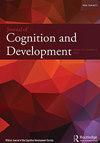早期算术的认知基础取决于算术问题的形式——一项针对五岁儿童的研究
IF 1.6
2区 心理学
Q3 PSYCHOLOGY, DEVELOPMENTAL
引用次数: 0
摘要
本文章由计算机程序翻译,如有差异,请以英文原文为准。
The Cognitive Underpinnings of Early Arithmetic Depend on Arithmetic Problem Format: A Study with Five-Year-Old Children
ABSTRACT Children’s arithmetic performance is dependent on the arithmetic task format, but little is known about how domain-specific and domain-general abilities contribute to solving diverse arithmetic problems. In this study, 145 Italian typically developing children between the ages of five and six, who have not yet received formal schooling, were administered the same addition problems in diverse formats (nonverbal problems, story problems, number-fact problems), diverse number-knowledge tasks (set comparison, number sequence, set to numerals, and count principle tasks), and domain-general tasks (fluid intelligence, language, visuoconstructive skills, working memory, and inhibition tasks). Results indicated that children were more accurate on nonverbal problems, followed by story problems and number-fact problems. Furthermore, performance on diverse problems was differently associated with the other variables, which suggests that different problem formats draw on different cognitive skills.
求助全文
通过发布文献求助,成功后即可免费获取论文全文。
去求助
来源期刊

Journal of Cognition and Development
Multiple-
CiteScore
4.00
自引率
0.00%
发文量
29
期刊介绍:
The Journal of Cognition and Development is the official journal of the Cognitive Development Society (CDS). Some CDS members are concerned with basic research or theory; others focus on policy issues and practical applications. The range of interests includes cognitive development during all stages of life, and we seek to understand ontogenetic processes in both humans and nonhumans. Finally, their interests encompass typical as well as atypical development, and we attempt to characterize both biological and cultural influences on cognitive change and continuity.
 求助内容:
求助内容: 应助结果提醒方式:
应助结果提醒方式:


